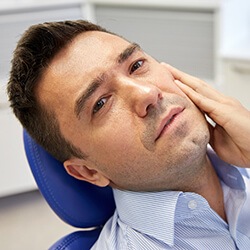TMJ Treatment – Greenfield, MA
Relief for Persistent Jaw Pain

The TMJs, or temporomandibular joints, are the hinge joints that connect your skull to your lower jaw, or mandible. When these joints become damaged or stressed, you may start to experience persistent jaw pain and a range of other symptoms. Fortunately, our Greenfield dental team is ready and eager to help you find relief! With our non-invasive TMJ treatment options, we may be able to help you regain full and pain-free dental function.
Why Choose BGH Dental for TMJ Treatment?
- Multiple Conservative Treatment Options
- Caring & Compassionate Dental Team
- Effective Relief for Persistent Jaw Pain
What Is TMJ Disorder?
 TMJ disorder, also known as TMD, is a condition that affects the temporomandibular joints, which control the movement of the lower jaw and play a large role in eating and speaking. TMD can be provoked by a variety of circumstances. Patients diagnosed with arthritis or previous injuries in the TMJs can be predisposed to the disorder, as can those with spinal problems. A common cause is bruxism, or the act of clenching and grinding teeth. Stress, injury, and malocclusion (bite misalignment) can contribute to the development of bruxism and TMD.
TMJ disorder, also known as TMD, is a condition that affects the temporomandibular joints, which control the movement of the lower jaw and play a large role in eating and speaking. TMD can be provoked by a variety of circumstances. Patients diagnosed with arthritis or previous injuries in the TMJs can be predisposed to the disorder, as can those with spinal problems. A common cause is bruxism, or the act of clenching and grinding teeth. Stress, injury, and malocclusion (bite misalignment) can contribute to the development of bruxism and TMD.
Symptoms of TMJ Disorder
 TMD can cause numerous symptoms that affect oral function. For example, you may experience frequent jaw pain, pain in your facial muscles, difficulty chewing, limited jaw movement, and more.
TMD can cause numerous symptoms that affect oral function. For example, you may experience frequent jaw pain, pain in your facial muscles, difficulty chewing, limited jaw movement, and more.
It is also important to note that symptoms of TMD can go beyond the mouth. In fact, this disorder is often associated with a broad range of other issues, including headaches, migraines, ringing in the ears, neck pain, back pain, shoulder pain, and more.
Types of TMJ Treatment
 Fortunately, at BGH Dental, we offer several types of therapy for TMD. We often begin with the least invasive options, such as changes in habit and diet, medication, or simply learning new relaxation techniques. These at-home techniques often work best when paired with a professional treatment, such as an occlusal splint or equilibration. When you visit us for a consultation, we will perform a thorough examination to find out which treatment may be best for your unique circumstances.
Fortunately, at BGH Dental, we offer several types of therapy for TMD. We often begin with the least invasive options, such as changes in habit and diet, medication, or simply learning new relaxation techniques. These at-home techniques often work best when paired with a professional treatment, such as an occlusal splint or equilibration. When you visit us for a consultation, we will perform a thorough examination to find out which treatment may be best for your unique circumstances.
Occlusal Splint
 A custom-made nightguard, also known as an occlusal splint, may be worn to hold the jaw joints in their ideal resting position while you sleep. This can reprogram jaw muscles, in some cases, so that the nightguard is a temporary treatment. However, other patients find success in wearing their nightguard indefinitely.
A custom-made nightguard, also known as an occlusal splint, may be worn to hold the jaw joints in their ideal resting position while you sleep. This can reprogram jaw muscles, in some cases, so that the nightguard is a temporary treatment. However, other patients find success in wearing their nightguard indefinitely.
Equilibration/Occlusal Adjustment
 Equilibration is a form of bite adjustment, wherein we make minor modifications to your teeth and/or crowns in order to help your upper and lower teeth work more harmoniously together. This can relieve stress on your TMJs and the surrounding muscles. It may provide a long-lasting reduction in TMD symptoms.
Equilibration is a form of bite adjustment, wherein we make minor modifications to your teeth and/or crowns in order to help your upper and lower teeth work more harmoniously together. This can relieve stress on your TMJs and the surrounding muscles. It may provide a long-lasting reduction in TMD symptoms.


